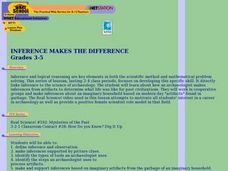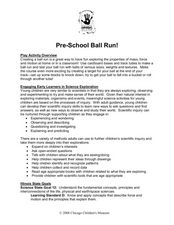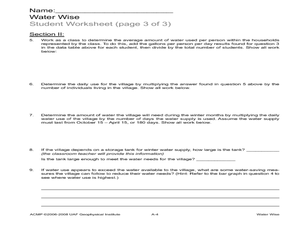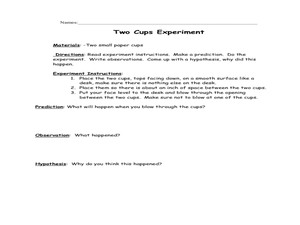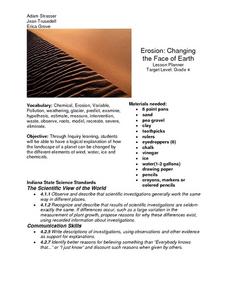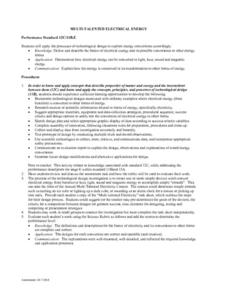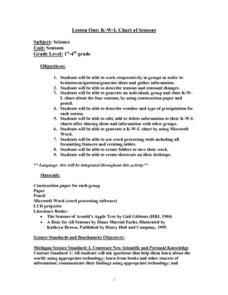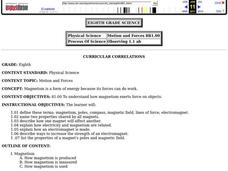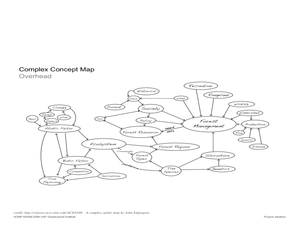Curated OER
Snowfall
Students examine the differences between snow and rain. In this precipitation lesson, students measure one inch of rain and snow to calculate the amount of liquid water. Students use a snowfall "conversion" chart to measure how much...
Curated OER
The Microscope
Students investigate the parts and functions of a compound microscope. They explore various websites, label the parts of a microscope on a worksheet, view prepared slides, and create drawings of the prepared slides.
Curated OER
Clouds
Third graders complete various activities about clouds. They create a cloud in a lab, write a cloud story, make a cloud model and complete a webquest.
Curated OER
Energy in Today's Global Society
High schoolers explain how heat is used to generate and produce electricity. In this energy instructional activity students complete several activities that show them about the different fuels used for heating.
Curated OER
Inference Makes the Difference
Students explore how archaeologists make inferences from artifacts to explore what life was like in the past. In this archaeology lesson, students work in groups and make inferences about an imaginary household based on modern day...
Curated OER
Pre-School Ball Run
Students demonstrate force and motion by rolling a ball through a tube. In this motion lesson students explore what happens to the ball when it is rolled with other balls of various sizes, weights, and textures.
Curated OER
Water Wise
Students calculate their family's water consumption. In this water usage lesson, students discuss the water they use in their homes. Students complete the 'water wise' worksheets to tally their family's use of water. Students answer...
Curated OER
Understanding Bernoulli's Principle
Fifth graders explain why we fly. In this space science activity, 5th graders discuss Bernoulli's prinicple and its relation to flight.
Curated OER
Structure of the Earth
Sixth graders investigate earthquakes and volcanoes. They demonstrate fault lines with a folded piece of paper, conduct an erosion experiment, and construct a volcano using clay, baking soda and vinegar.
Curated OER
Using a Thermometer
First graders use their senses to formulate questions and make predictions to determine what is in the "Wonder Bag". They hold pieces of ice and examine while listing descriptors on a chart and then take their own temperature using an...
Curated OER
Fantastic Friction!!!
Students work in small groups to list at least 10 items that have movement or motion choosing one item from the list to use as a topic for the following questions: How does this item move? How can we slow down the movement? How can we...
Curated OER
Classification
Fifth graders analyze the necessity of classification. They distinguish between living and nonliving things in our world and recognize the six life functions of living things by identifying 15 classroom objects.
Curated OER
The Mechanisms of Decay and Decomposition
Eighth graders study how all living things die. They are introduced tot he life cycle and the concept of an ecosystem. Students have a introductory exposure to trophic levels (producer-consumer-decomposer) in the environment.
Curated OER
Poster Assignment: Sports Chemistry
Tenth graders distinguish between chemical and physical properties and changes in matter when given specific examples. They view a video of sports activities. Students chose their favorite sport and design an experiment to improve sports...
Curated OER
Tracking Current "Earth" Events
Eighth graders utilize Internet research skills, and practice their communication skills by presenting their research to the clas. They actively consider the types of hazards for humans associated with Natural Disaters and ways that...
Curated OER
Erosion: Changing the Face of Earth
Fourth graders explore how the landscape of the planet can be changed by different elements of wind, water, ice and chemicals through hands-on activities. They examine pictures of areas around town and discuss anything they think is out...
Curated OER
Multi-Talented Electrical Energy
Students explore energy conversions by demonstrating the conversion of electrical energy into light, heat, sound, and magnetic energy. Students create a simple device that converts electrical energy from batteries to heat, light, sound...
Curated OER
K-W-L Chart of Seasons
Students think about what kinds of clothing they are currently wearing and then think about why they are wearing these particular articles of clothing. They write what they already know about seasons and generate questions about what...
Curated OER
Motion and Forces
Eighth graders define the terms: magnetism, poles, compass, magnetic field, lines of force, electromagnet. They name two properties shared by all magnets and describe how one magnet will affect another.
Curated OER
Project Jukebox
Students analyze an interview with the Climate Change Project Jukebox in order to help them undertand how to use a concept map. In this writing and climate change lesson, pairs of students log onto the Internet site for Climate Change...
Curated OER
Coffee Cooling
Pupils explore the factors that affect how long coffee stays hot. They develop a question and a testable hypothesis for one factor such as initial temperature or size of opening of the container. Then they design and conduct an...
Curated OER
Major Functions
Seventh graders investigate the basic characteristics and needs of living things. They identify the major parts of plants and animals by making lists. Students focus upon one living thing and speculate how if one part is changed how it...
Curated OER
Using Newsprint as a UV Detector
Students investigate the effects of UV radiation. In this earth science lesson, students explain how the time of day relate to UV abundance on Earth. They determine if weather affects the amount of UV that Earth receives.
Curated OER
Deep Freeze
Students practice various sampling methods for retrieving data under water, ice, and soil. They use the sample material to make temperature measurements, chart contents, and draw their own conclusions as to what is happening in the...






